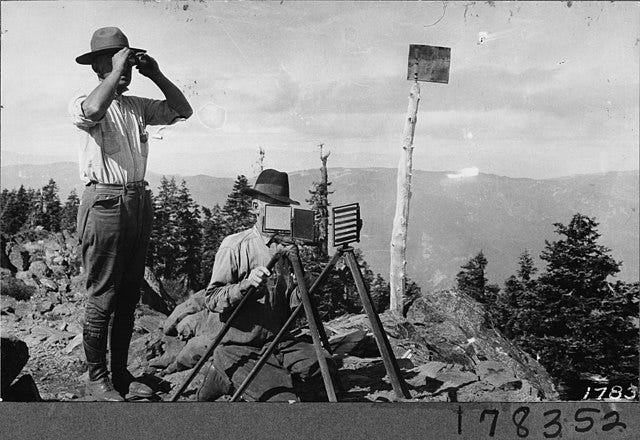DOGE: When 'oversight' backfires
The impact of credit card policy changes on the U.S. Forest Service and local communities across America. A Forest Service Ranger speaks out.
On Feb. 26 President Donald Trump ordered a 30-day suspension of credit card use at all federal agencies, except for disaster-relief services approved by his newly created ad-hoc agency, Department of Government Efficiency (DOGE), headed by the Nazi-saluting richest person in the world, Elon Musk, who owns the social media platform, X.
Ostensibly, DOGE was created on January 20, Inauguration Day, by Trump’s executive order, to “shrink the size of the federal government and cut off any waste or inefficiency found in its operations”—source, Newsweek.
In reality, DOGE is part of a MAGA-fascist, oligarchic, chaos-producing shake-down machine designed to disembowel the democratic republic of the United States of America and to endlessly increase the wealth and power of oligarchs—at the expense of the rest of us, even if it means eventually killing all life on Earth.
On March 11, DOGE (Musk that is) announced on X, according to Newsweek, that “After three weeks, >200,000 credit cards have been deactivated. Great progress this past week …”
By March 25, as reported by U.S. News & World Report, almost 300,000 “government credit cards have been canceled or reduced to a $1 credit limit”; again, excluding cards for disaster relief, subject to Elon Musk’s permission.
U.S. News wisely recommended that any federal employees whose government credit cards were discontinued restrain themselves from using their own credit cards for work-related purchases.
Like other federal agencies under attack by Trump’s policies, the USFS already has other troubles caused by massive budget freezes and thousands of layoffs, with more cuts coming soon.
As reported by Politico on April 7, 700 of the Forest Service’s highly-trained firefighters and fire prevention specialists—the “backbone” of the agency’s 10,000 member firefighting force—were abruptly terminated in a February “Valentine’s Day massacre.”
Forest Service employees nationwide, interviewed by Politico, reported that thousands of DOGE staff cuts have had far-reaching effects, redirecting the agency’s focus from environmental stewardship to industry and firefighting.
Some Forest Service employees told Politico that “This agency is no longer serving its mission” and that it was facing internal chaos, “which is sort of the point,” according to another employee.

The United States Forest Service (USFS), founded in 1905, operates under the U.S. Department of Agriculture. Its 35,000 employees oversee 193 million acres of forests and grasslands across 43 states, the Virgin Islands, and Puerto Rico. The USFS website describes the agency as a global leader in research and a model for sustainable forest management, as well as the conservation of natural and cultural resources on public lands.
Recently, SoCal Water Wars connected with a Forest Service employee working full-time in the Western United States. The employee, who requested anonymity to avoid retaliation, provided a detailed written statement outlining a variety of “unforeseen” effects of DOGE’s “well-intentioned” credit card restrictions on acquiring essential equipment for daily operations. T
The statement, lightly edited for clarity, is shared below. — John Earl, Editor, SoCal Water Wars
DOGE: When ‘oversight’ backfires
Written by a United States Forest Service ranger working in the western United States of America.
The restriction of credit cards for U.S. Forest Service (USFS) personnel has triggered unforeseen consequences, hampering efficiency of forest operations and impacting local communities. The changes have caused delays in essential tasks, disrupting routine maintenance, and imposed financial strain on local vendors.
Previously, each forest district, typically overseeing around 100 personnel across 2–6 sub-districts, had 6–10 credit cards assigned to specific employees for purchases to ensure smooth daily operations.
For example, districts would use the cards for essential purchases, such as office supplies, T-posts for maintenance, vault toilet services, equipment fuel, physicals required for firefighting, newspaper notices, trash disposal, and safety gear.
But these credit cards have been eliminated due to recent policy changes mandated by the Trump administration’s Department of Government Efficiency (DOGE). Now, all purchases must go through a single employee at the forest level who is responsible for managing orders for multiple districts, creating major challenges for USFS personnel.
Districts are no longer able to quickly obtain the supplies and resources needed to do their work. As a result, essential tasks such as clearing downed trees, performing emergency repairs, and maintaining forest health have been delayed or halted due to a lack of necessary supplies, like chainsaw fuel.
The decision to centralize purchasing under a single forest-level employee was made to prevent fraud and misuse of government funds. However, there was no historical evidence of significant fraud or mismanagement. Previously, each purchase underwent secondary review to minimize inappropriate spending. USFS personnel were also trained to handle budgets responsibly, ensuring all purchases were justified and properly documented.
The policy shift has caused critical operational inefficiencies and mounting costs, severely hampering the Forest Service’s ability to function effectively. With supply purchases bottlenecked under a single employee for multiple districts, lead times have become alarmingly unpredictable. Items once readily accessible are now delayed, undermining the agency’s ability to respond swiftly to emergencies or perform essential maintenance.
These setbacks jeopardize forest health and public safety, with delays in acquiring tools like chainsaw fuel, creating dangerous vulnerabilities. Compounding the issue, the mandatory use of GSA Advantage does not necessarily mean lower costs, as the program offers limited options and unknowable delivery schedules compared to local vendors, further straining resources.
The financial impact of these changes goes far beyond the Forest Service. Rural "gateway" communities near national forests, parks, and wilderness areas are intricately tied to federal agencies like the USFS for their economic stability, social fabric, and cultural identity.

These communities depend on the federal government not only for direct employment but also for driving their local economies through tourism, land management, and resource access. As a lifeblood to these regions, disruptions to USFS operations jeopardize the livelihoods and well-being of these interconnected communities.
These challenges underscore the broader consequences of policy decisions that, while aiming to improve financial oversight, overlook the practical realities of field operations and the importance of maintaining local economic ties.
The restriction of credit card use for USFS personnel, though well-intentioned, has disrupted the ability of the agency to effectively carry out its vital work and has created ripple effects that extend beyond the federal budget to affect communities and service providers.




